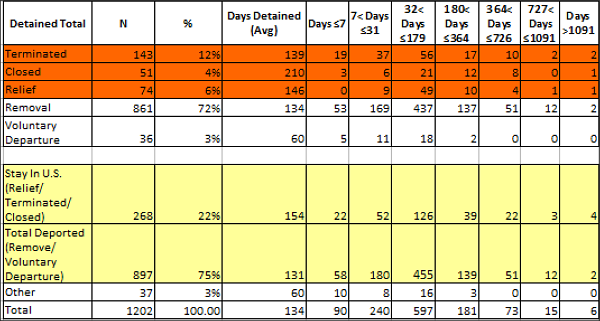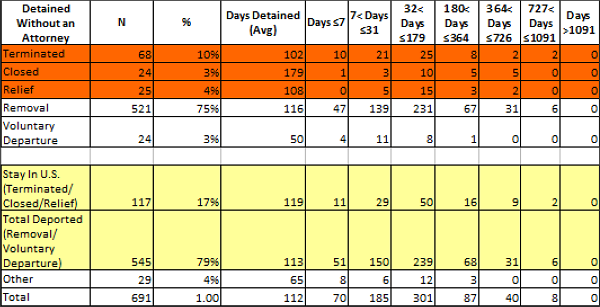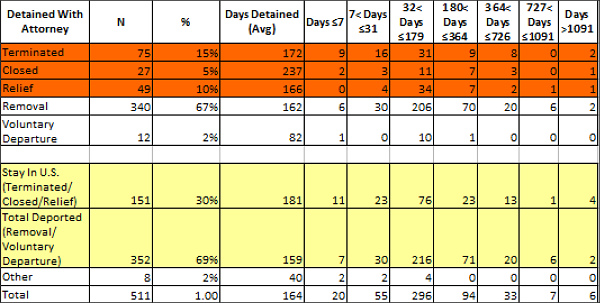UNITED STATES CITIZENS IN DEPORTATION PROCEEDINGS
Immigration Court "Code 54" Adjournments, January
1, 2011 to June 9, 2017
In a
2013
letter to the New
Yorker John Morton, then ICE Assistant Director, stated
that the US citizens ICE had detained and deported were in the rearview
mirror. The problems documented in
the New Yorker
article covering the case of Mark Lyttle, as reported in a 2011
law review article, had been rectified by "new
safeguards to protect against the possibility of a citizens's
detainment or removal," Morton claimed.
Reading Morton's assertion in 2013 was alarming. We were
still receiving the
same steady
stream of reports of U.S. citizens detained and deported.
So we filed a FOIA request on immigration court cases adjourned
based on claims of U.S. citizenship. A couple of years later,
Northwestern student Elizabeth Meehan analyzed the first release, reported
here.
Last
month we received data
from January 1, 2011 -- after the changes Morton claimed had removed
this as a possibility -- through June, 2017. They
show 268 people
who were detained were released after asserting their U.S. citizenship
claims in immigration court.
So the detention of U.S. citizens as aliens today is not just possible
but remains a
fact. Moreover, when he wrote the letter, Morton
knew this. (FOIA
Case no 2015-ICFO-0500, 109 pages, showing cases of which
Morton was aware when we wrote New
Yorker letter, including this
one.) This is part of a long history of ICE dissembling on
this embarassing fact.
The
links below are to analyses, cleaned up data, and original Excel
spreadsheets with data responsive to requests
of the Executive Office of Immigration Review for cases from
January 1, 2011 to June 9, 2017
with an adjournment code 54, available to immigration judges to enter
when respondents assert United
States citizenship as
a defense against removal. (For more on this, please see Citizenship in Question:
Evidentiary Birthright and Statelessness, ch.
12, Duke University Press, 2017, open access.)
We would appreciate credit to the Deportation
Research Clinic, Northwestern University when quoting from
our analysis of the data.
CAUTION:
Cross checks using immigration court hearing dates, locations, and
immigration judges for known cases of U.S. citizens in immigration
courts in this time frame indicate that the vast majority are
not included. (Two of
23 cases chosen at random are in the EOIR release for Code 54
adjournments. Both of these were cases brought to the
attention
of EOIR by the blog http://stateswithoutnations.blogspot.com; an
additional case is coded as a "removal" but the final outcome was a
"termination.") On this basis, the Deportation Research Clinic will be
appealing EOIR's recent release and
assesses it is impossible to make any quantitative inferences from this
data other than ICE is still detaining U.S. citizens.
Reasons
for U.S. citizens appearing in immigration court and not appearing in
this dataset are that adjudicators may not know a respondent has a
claim of U.S. citizenship; may deport the person at the first hearing,
which means there would be no adjournment code; or may code the
adjournment using an adjournment code for "seeks more time for any
attorney" or
another valid reason that is not the claim of U.S. citizenship.
However, EOIR's own case management database for two U.S.
citizenship cases in Clinic files shows adjournments based on "alien
claims U.S. citizenship," and yet these cases also do not appear in the
Excel output EOIR sent us. (See below for three cross check
examples.)
Other cases cross-checked are
confidential and maintained by the Deportation Research Clinic.
Tables produced by Clinic Research Assistant Avery Miller.
Table I - Code 54 Cases 2011 -
2017 (June 9) Outcomes
Table II - Code 54 Adjournments, 2011 - 2017 (June 9)
Outcomes by Year - Detained,
Never Detained, Released

Table III - Code 54 Adjournments,
2011 - 2017 (June 9)
Detained, Days in
Custody before Final Order

Table IV - Code 54 Adjournments, 2011 - 2017 (June 9)
Detained, Days in Custody before
Final Order, With Attorney
Table V - Code 54 Adjournments, 2011 - 2017 (June 9)
Detained, Days in Custody,
Without Attorney

Outcome
Key
Termination:
Immigration Judge (IJ) orders release based on claim of U.S.
citizenship.
Administrative Closure:
IJ closes proceeding without issuing an order. Respondent is released.
(Likely means IJ believes person is a U.S. citizen.)
Prosecutorial Discretion
(PD): ICE closes case, respondent is released. (Likely
means ICE assesses they wrongfully arrested and held a US citizen.)
Relief Granted:
After finding unlawful presence, IJs may grant relief nonetheless based
on
factors such as residence or hardship on close relatives who are U.S.
citizens. Cross checks using ICE internal e-mail on specific cases,
recently obtained by the Clinic, indicate EOIR coding ICE orders
overturned due to U.S. citizenship as "relief granted," although the
legally correct outcome is a "termination."
Voluntary Departure:
Respondent elects to return to designated home country, may pursue U.S.
citizenship claim from abroad and typically is eligible for permission
to return after five years. Respondent pays for travel.
Removal:
Mandatory order of removal. Respondent typically eligible for
permission to return after 20 years. Government pays for travel.
Stay in US: Any
outcome (Terminated, Relief Granted, Administrative Closing) that
results in the individual remaining in the US.
Deported: Removal
Orders or Voluntary Departure.
Other: Any
other outcome, includes change of venue, transfer,
null
Code 54 Databases Created and
Used for Analysis
Deportation Research
Clinic Data
Excel spreadsheet,
combined data with duplicates removed, prepared by research assistant
Avery Miller.
Data
2011-2014, original Excel release
January 1, 2011- September 30, 2014, EOIR FOIA Case no. 2014-23528
Data
2014-2017, original
Excel release
October 1, 2014 to
June 9, 2017, EOIR FOIA Case no. 2017-29435
Data
2008-2017, updated Excel release
September 2, 2008 to September 11, 2017, EOIR FOIA Case no. 2017-29435
Cross-check Examples.
These are examples from our case files in which
people made
claims of U.S. citizenship in immigration courts and yet the dates,
hearing locations, and outcomes for these cases do not appear in EOIR's
data. For some, cases are not present. In others,
there are
adjournments on the date and locations indicated in a case file, but
the outcome is coded as "removal," even though the actual outcome is
"terminated" or pending. This means that either there
happened to
be two
claims of US Citizenship before the same IJ on the same date and one
resulted in a removal and is listed and another resulted in a
"termination" and is missing, or EOIR's
output are incorrectly indicating a "termination" as a "removal."
Cross check examples:
1)
Houston: "During immigration proceedings on 09/22/2014
claimant
made a claim of US citizenship based on his relationship to
his
citizen father..."

2) Houston (Frank
Serna), 2004, docket 2012-13.
3) York, PA, termination order, 2002-2015.
N600
Data, 1999-2011 - Petitions for Certificates of U.S. Citizenship:
affirmations, denials, pending, by Field Office
N-600
Adjudications by USCIS,
analysis for 1999-2011, by US Citizenship and Immigration Services
(USCIS) district office, year, and outcomes of applications for
Certificates of Citizenship, submitted by foreign born individuals for
proof that they were automatically U.S. citizens at birth by operation
of law. Immigration judges often, unlawfully,
require people
in ICE custody who are asserting U.S. citizenship to "apply" to USCIS
for this Certificate, even though it is just an administrative rubber
stamp of an underlying legal fact and not the creation of U.S.
citizenship. The immigration court has jurisdiction to rule on the same
evidence that would be submitted to USCIS for this Certificate. (An
N-600 is different than an N-400, the application legal residents to
naturalize--a Certificate based on an N-400 has one "A" in front of it
and one based on the N-600 application has 2 "As" on the Certificate.)
USCIS, part of the Department of Homeland Security, has
deferred to ex parte requests from ICE attorneys, as the Clinic has
documented occurred in Houston and in New York City for cases in which
bona fide U.S. citizens were seeking relief from deportation. In other
words, ICE attorneys appears in immigration court as a third party to
USCIS denials that ICE attorneys behind the scenes are secretly
assisting in creating.
Data
from 1999-2011, original Excel release, USCIS
FOIA 2013-COW2013000557.
***
June,
2017 States Without Nations post
on legal history of immigration courts and immigration judges, with
link to June 27 oral argument in 11th circuit case on whether
immigration judges are judicial, tied to adjudicator William Cassidy,
who in 2008 ordered the deportation of Mark Lyttle to Mexico, despite
the fact that he spoke no Spanish, had no relatives in Mexico, and had
signed a sworn statement that he was born in Rowan County, North
Carolina.






